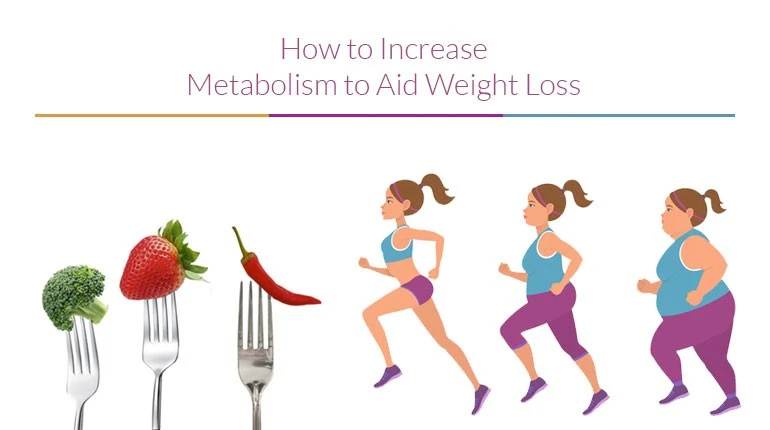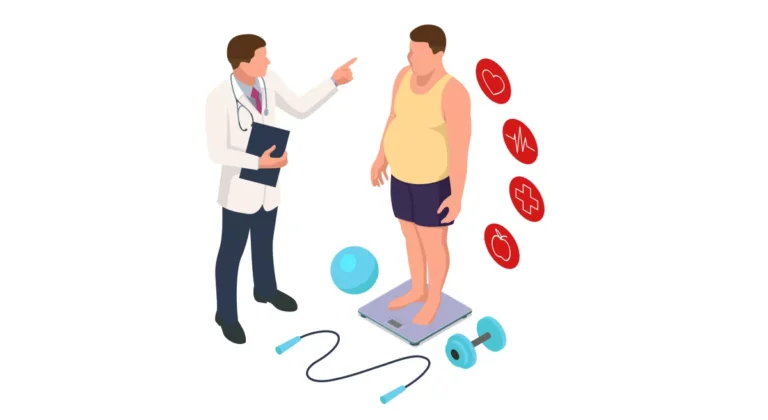How To Increase Metabolism?
Overview
Increasing metabolism involves adopting habits that boost your body’s ability to burn calories efficiently. Key strategies include regular exercise, especially strength training and high-intensity interval training (HIIT), staying hydrated, eating protein-rich meals, and ensuring adequate sleep. Small lifestyle adjustments, like eating smaller, frequent meals and reducing stress, can also support a healthier metabolic rate.
The biggest factor influencing your metabolism is your genetic composition. However, if you want to reduce weight, don’t let that stop you from changing your lifestyle. You may increase your metabolism in a few different ways.
What is metabolism?
The process by which your body turns the food and liquids you consume into energy is called metabolism. Everything you do, including breathing, growing, and giving your brain the energy to think, is powered by this intricate process.
Whether you’re at rest or exercising, your body constantly burns calories, which are a measure of energy:
- Basic bodily functions: Your body needs energy to maintain essential processes like breathing, blood circulation, and cell repair even when you’re asleep or relaxing. Your basal metabolic rate (BMR) is the term used to describe this type of energy inefficiency.
- Daily activities: Talking, walking, moving around, and performing daily duties all contribute to calorie burn.
- Exercise: Your body burns more calories when you engage in physical activities like swimming, running, or weightlifting.
Genetics has a major impact on metabolism. However, you can change your lifestyle in a few ways that might help speed up your metabolism.
The part metabolism plays in weight loss is one of the main reasons someone might wish to increase their metabolism. Weight loss happens whenever the body consumes more calories than it intakes. At rest and when exercising, a person with a higher metabolic rate will burn more calories than someone with a lower (or slower) metabolic rate.
So how can you pick foods that will speed up your metabolism instead of slowing it down? Certain foods may increase resting metabolic rate by influencing diet-induced thermogenesis (DIT), according to research. The following foods may have this effect:
The amount of energy or calories our bodies require to function daily is simply known as metabolism. When this power generation, storage, and transmission process is out of balance, your body may be susceptible to metabolic imbalances, which can result in health issues. Diabetes is an established example of the body’s incorrect blood sugar metabolism.
Because males often have higher muscle mass than women, their metabolisms typically run 10–15% faster. Sadly, women must put forth more effort to achieve the same outcomes.
Simple and Efficient Methods To Boost Your Metabolism
Your metabolism can be supported by several basic yet effective approaches, many of which need minor dietary and lifestyle adjustments.
Your metabolism is the method by which the minerals and vitamins in the food you eat are transformed into activity. This gives your body the energy for breathing, movement, food digestion, blood circulation, and tissue and cell repair.
An elevated resting metabolic rate indicates you burn a greater number of calories. Your age, food, body composition, sex, body size, level of physical activity, health, and any medications you take are just a few of the many variables that might impact your metabolism.
To assist weight management and general health, several evidence-based treatments might help you speed up your metabolism.
How To Increase Of Your Metabolism?
The rate at which a person’s body burns calories for energy is known as their metabolism. Age, degree of activity, heredity, and other variables can all affect metabolic speed. Sleep, exercise, and regular meals may all support metabolism.
The energy the body uses for many processes like breathing, food digestion, blood circulation, cell growth, wound healing, and even thought is measured in calories. The metabolic rate is the pace at which energy, or calories, are burned by the body.
This can be influenced by variables including age, sex, and the activity the individual is engaged in at the moment. Individual differences may exist in the rate. The more muscles a person has, the higher their metabolic rate.
It indicates that certain methods may help the body consume calories more quickly, even if a person has little influence over the hereditary components of their metabolism. It is important to remember that increasing metabolism can aid in weight loss by burning calories, but it must be used in conjunction with a balanced diet and frequent exercise.
- Exercising more
- Eating less fat and more complex carbs
- Planning your meals
- Eating at regular times
- Limiting alcohol and sugar
- Getting enough sleep
Why Is the Majority Of Metabolism Advice Incorrect?
Several individuals consider that they may increase their metabolic rate and burn more calories by exercising or eating specific meals, which will aid in weight loss. When we look at how quickly you burn calories, we can see that your body uses the majority of that energy to stay alive. Furthermore, it is difficult to alter the fundamental rate at which this occurs.
But don’t worry, there are steps you may do to determine the most effective weight loss strategy.
Because of this, general recommendations that claim that eating more broccoli or chili peppers can increase metabolic rate and burn more calories are not supported by reliable studies.
However, there isn’t a miracle drug that can help you burn calories or reduce weight.
However, we think there are some things that everyone may gain from. You can find what works for you regarding your weight and eating choices by trying them.
Nutrition and Metabolism
To lose weight, a lot of people go on a diet or follow strict dietary habits. This is because when your body perceives a decrease in caloric intake as a danger of starving, it gradually slows down your BMR and burns fewer calories. This is one of the reasons weight loss is frequently challenging.
So how can you pick foods that will speed up your metabolism instead of slowing it down? Certain foods may increase resting metabolic rate by influencing diet-induced thermogenesis (DIT), according to research. The following foods may have this effect:
Metabolism is a method by which the human organism turns both water and food into energy. Throughout that procedure, breath and nutrients from food and drink interact to give the body the energy it needs.
A body requires energy for everything it performs, even while it is at rest. Breathing, blood circulation, hormone balance, and cell growth and all added to this. Basal metabolic rate, commonly referred to as basal metabolism, is the quantity of calories used by the body while it is at rest to accomplish these tasks.
A body’s daily energy consumption is determined by further two variables that are separate from the basal metabolic rate:
- How food is used by the body. Calories are burned during meal digestion, absorption, movement, and storage. Nutrient absorption and food digestion account for about 10% of total caloric intake.
- The amount that a body moves. The remaining calories a body burns each day are made up of any movement, such as chasing a puppy, going to the store, or playing tennis. Both increasing physical activity and simply moving more during the day can significantly alter this.
Weight and Metabolism
You may wish to attribute weight gain and a sluggish metabolism to a medical ailment. However, a medical illness seldom slows metabolism enough to result in significant weight gain. Cushing syndrome and hypothyroidism are two conditions that can lead to weight gain. These are rare conditions.
Weight increase is influenced by numerous factors. Genes, hormones, nutrition, and lifestyle factors including stress, physical activity, and sleep are probably among them. Weight gain results either from taking more energy than you waste or eliminating fewer calories than you ingest.
Weight loss appears to be easier and faster for some people than for others. However, everyone loses weight when they burn more calories than they consume. You must consume fewer calories or increase your caloric expenditure through exercise if you want to lose weight. You can also do both.
The Factors That Affect Your Metabolism
Numerous things influence your metabolism. You can alter some of them, but not all of them. These consist of:
Genes. A few genetic factors impact how much energy your body needs. Larger people typically require more calories since they have more muscular mass. Because they usually have greater muscle mass and less body fat, men have a greater amount of calories.
Age. A prevalent mistake is that as you grow older, your metabolism decreases significantly. However, age is not the primary issue. You may have decreased muscle mass, and be less physically active, and your diet may not adjust to your body’s needs as you age. A sluggish metabolism is the result of all of these factors.
Eat a diet. There are no diets, eating regimens, or miraculous foods that can keep your metabolism going. However, you can still use your diet to increase your metabolism. Your body will get the energy it needs from a diet that consists of regular meals, a healthy quantity of calories, and decent carbs.
Intermittent fasting is a well-liked diet to increase metabolism. This entails eating for a predetermined time each day—typically eight hours—and skipping meals the remainder of the day. Your body begins using the energy stored in your body’s fat once the energy it has consumed is depleted. Your body might be able to release any accumulated excess fuel as a result.
Obesity, diabetes, heart disease, and weight loss can all benefit from intermittent fasting. Selecting a plan that fits your needs and health is crucial because there are numerous options. Consult your physician before attempting it.
Go to sleep. Your blood sugar, or glucose, is regulated in part by sleep. Your body struggles with glucose levels when you don’t get enough sleep, which leaves you feeling lethargic.
Sleep aids and minute counting are not part of good sleep practices. Ensure that you’re sleeping well by:
- Getting into bed and waking up at identical times every single day
- Try away from nicotine, caffeine, and prolonged naps a few hours before bed.
- Avoid clear of blue light from devices like phones, computers, and TVs before bed.
Your body can burn more energy when you sleep. Your body will burn more calories while at rest if you increase your metabolism with food and exercise.
Work out. unique part of the solution is exercise. Moving your body utilizes the most energy and burns calories. Moving consistently, even a walk around the block, can enhance your metabolism to help you consume excess energy, burn fat, and improve your heart health.
Muscle-strengthening activities are also required to ensure that you have an appropriate percentage of muscle. The symptoms of common metabolic illnesses will be lessened with more strenuous strengthening workouts.
Complete Analysis Of Metabolism And Movement
Your basal metabolic rate is difficult to regulate, but you can manage how many calories you burn while you exercise. In actuality, some people who appear to have a quick metabolism are most likely simply more active than others, and they may even fidget more.
The Physical Activity Guidelines for Americans advise doing the following to increase caloric expenditure:
- Aerobic exercise: Generally speaking, try to get in at least 30 minutes of moderate exercise each day. You might need to increase your exercise if you want to reach certain fitness objectives, reduce weight, or keep it off. Activities like brisk walking, biking, swimming, and lawn mowing are examples of moderate aerobic exercise. Running, strenuous garden work and aerobic dancing are examples of vigorous aerobic exercise.
- Strength training: Participate in strength training exercises for every single one of the main muscle categories at least every two weeks. Utilizing weight machines, your body weight, hefty bags, resistance tubing or paddles in the water, or engaging in activities like rock climbing are all examples of strength training.
Should you increase your muscle mass to speed up your metabolism?
By increasing muscular mass, strength training workouts can increase metabolism. Compared to fat, muscle burns more calories. This implies that your BMR will increase with your level of muscle mass. The best indicators of BMR are your genetic composition and overall muscle mass.
Additionally, strength training causes excess post-exercise oxygen consumption (EPOC), which has a calorie-burning impact after exercise. More calories are expended after vigorous workouts because the body needs more oxygen to return to its resting state.
After an exercise, high-intensity interval training (HIIT) may also increase metabolism for a while.
Is it possible to increase your metabolism?
Your body uses your metabolism to transform food into energy for all of its processes. The metabolic process requires energy to breathe, think, digest, circulate blood, stay heated in the chilly, and preserve cool in the hot.
Increasing your metabolism is thought to help you burn more calories. Unfortunately, there are more myths than effective strategies when it comes to increasing metabolism. Myths can sometimes backfire. You risk eating more than you should if you believe you are burning more calories than you are.
These are the truths about the six myths about metabolism.
1. Long after you stop exercising, your metabolism continues to increase.
Exercise indeed increases calorie expenditure, particularly when engaging in high-intensity activities like swimming or biking.
You burn extra calories as frequently as you exercise. The benefits of exercise don’t end there, however, you may continue to burn more calories for an hour or so after that. Your metabolism will return to its resting level as soon as you stop moving.
You run the danger of gaining weight if you overeat after working out in the hopes that your body will continue burning calories throughout the day.
What to do: Stop in with small portions of nutritious foods and engage in physical activity for your well-being. Exercise should not be used as an explanation for overindulging in full-calorie meals and beverages.
2. Gaining muscle will aid with weight loss.
Compared to fat, muscle burns more calories. In actuality, but only in a minor way. Only a few pounds (less than kilos) of muscle are gained by the majority of regular exercisers. That is insufficient to significantly alter your caloric expenditure. Muscles also burn very little calories when they are not actively used. Your metabolism is usually primarily controlled by your brain, heart, kidneys, liver, and lungs.
What to do: To build stronger muscles and bones, lift weights. Include heart-pounding activities in your well-rounded workout regimen, including strength training. Include heart-pounding activities in your well-rounded workout regimen, including strength training. You must also consume a nutritious diet in sensible portions if you want to maintain your weight loss.
3. Consuming specific foods can increase your metabolism.
You won’t lose extra pounds (kg) by eating things like green tea, coffee, or spicy chili peppers. Some might give you a slight increase in metabolism, but not enough to change your weight.
What to do: Pick foods based on their flavor and nutritional value. Consume a range of nutritious foods that satisfy your hunger without making you feel bloated.
4. Your metabolism rises when you eat little meals throughout the day.
Unfortunately, the idea that eating small, frequent meals increases metabolism is not well supported by science.
By spreading out the food you consume during the day, you might be able to save yourself from eating too much. Eating smaller portions more frequently improves an athlete’s performance. Three meals a day may be easier for you to maintain an appropriate intake than numerous small snacks if you are the type of person who finds it difficult to stop eating once you start.
What to do: Be mindful of your hunger signals and eat when you are hungry. Monitor your daily intake and avoid too many high-fat, high-sugar snacks.
5. Sleeping through the night is beneficial to your metabolism.
While getting a good night’s sleep won’t increase your metabolism, skipping sleep can cause you to gain weight. People who don’t get enough sleep often overeat, perhaps as a coping mechanism for their fatigue.
What to do: Make sure you leave adequate time in your schedule for sleep. Make your bedroom sleep-friendly and find techniques to relax before bed if you have problems falling asleep. If self-care techniques for better sleep don’t work, consult your healthcare professional.
6. As you age, your metabolism slows down, which means you will acquire weight.
Although our metabolism is slower than it was as children, a lot of weight gain in midlife occurs as a result of our decreased level of physical activity. We acquire fat and lose muscle when we don’t move as much.
You can also experience difficulties controlling your eating habits as you age. Younger people typically eat less after a large meal until their bodies have burned off the calories. As people age, their innate ability to regulate their hunger appears to diminish. The cost of large dinners can go up rapidly if you’re not careful.
What to do: It’s critical to incorporate exercise into your daily routine as you age. You may prevent weight gain as you age by continuing to be active and eating fewer portions of nutritious foods.
FAQs
How can I speed up my metabolism?
Five strategies to increase metabolism
Get more exercise. To burn more calories in less time, incorporate interval training into your cardio regimen.
Use weight training. You can increase your resting calorie expenditure by gaining muscle mass.
Avoid missing meals, particularly breakfast.
Eat meals that burn fat.
Every night, get a decent night’s sleep.
What meals speed up metabolism?
Fish and shellfish are among the twelve kinds of foods that increase your metabolism and aid in weight loss.
Powers to Boost Metabolism: Omega-3 fatty acids and protein are abundant in fish, including mackerel, sardines, tuna, and salmon.
Legumes (Also known as beans)
Chili Peppers.
Lean Meats.
Low-Fat Milk.
Broccoli.
Lentils.
Oatmeal.
Is it possible to increase my metabolism?
Maintaining the right amount of calories, choosing protein over fat and carbs, getting enough sleep, and engaging in some forms of exercise, including resistance training, can all raise a person’s metabolic rate.
Does consuming water speed up metabolism?
Increases Your Metabolic Rate
Water consumption aids in fat burning. showed both men’s and women’s metabolic rates can rise by 30% after consuming seventeen fluid ounces of water. The metabolic rate can be slowed by 3% even in cases of mild dehydration.
What symptoms indicate a high metabolism?
The most typical signs and symptoms are:
Unexplained weight loss.
Increased appetite.
Sweating excessively.
Fatigue.
Quick and/or irregular heart rate.
Anemia.
Does a fast boost metabolism?
According to preliminary research, short-term fasts can increase metabolism by up to 14%, and other studies indicate that intermittent fasting doesn’t significantly reduce muscle mass.
References
- Rd, H. W. (2024, January 11). 8 ways that may speed up your metabolism. Healthline. https://www.healthline.com/nutrition/10-ways-to-boost-metabolism
- Clinic, C. (2024, September 6). How to increase your metabolism for weight loss. Cleveland Clinic. https://health.clevelandclinic.org/can-you-boost-your-metabolism-for-weight-loss
- Can you boost your metabolism? (n.d.). Mayo Clinic. https://www.mayoclinic.org/healthy-lifestyle/weight-loss/in-depth/metabolism/art-20046508
- Hewings-Martin, Y. (2024, March 15). How to increase metabolism: 7 simple ways. https://zoe.com/learn/how-to-increase-metabolism
- Restivo, J. (2024, July 1). Can you increase your metabolism? Harvard Health. https://www.health.harvard.edu/nutrition/can-you-increase-your-metabolism




